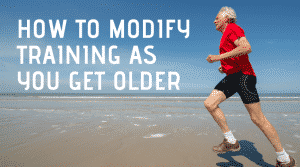We’re headed into the summer months.
Those days when even running in the early morning brings a good dose of heat and humidity. It impacts our race times and sometimes even the quality of our daily runs. Runners Connect even looked into how sunscreen impacts your performance when running.
If you run with a group, like I do, you know that there’s a wide range of hot and cold tolerance from one runner to the next. In my group, for instance, there are two or three girls who are still wearing full-length tights as the temperatures approach 50. I, and a few others in the group, am in shorts and maybe even short sleeves at that point.
I’ve always been someone who tends to overheat in races.
Those gals who wear tights to my shorts never worry about hot marathons, however I’ll avoid the possibility like the plague—I’ve never run a fall marathon before the month of November, for instance.
Aging and Heat
As I’ve aged, I’ve found heat to be more of an issue.
Now:
I thought maybe it was just my imagination, but it turns out there is evidence that masters runners don’t dissipate heat as well as their younger counterparts.
A 2013 study by Joanie Larouse, et al, investigated the ability of older runners to handle heat, and found that as early as the age 40, heat can be a bigger factor for runners.
The study examined the sweat and heat loss rates of 85 men, aged 20 to 70, as they rode stationary bikes over four, 15-minute sessions separated by 15 minutes rest between each.
With each additional set of exercise, the older participants sweat less than their younger counterparts, first beginning with the oldest age groups and working its way down all the way to the 40 to 44 year old group.
Other Factors Involved?
Interestingly, VO2 max and fitness levels were similar among all the participants, so when it came down to it, the only variable was age.
What’s the bottom line?
The researchers concluded “aging may have a larger influence on whole-body heat loss capacity than the fitness level or specific physical characteristics of the individual.”
This definitely falls in line with what own experience since turning 40, and I’ve heard from several masters’ friends who have dealt with it as well.
[bctt tweet=”Great advice and how to overcome heat as a masters runner from @Runners_Connect” via=”no”]
What can you do about it?
We know that we cannot change our age, and that means we need to be careful with some aspects of our running, like being at a higher risk of calf injuries.
Racing Schedule
One step I have taken is to ensure I am scheduling my most important races at times, or in locations, where the odds are low of heat being a factor.
As mentioned above, for instance, this means my fall marathons have all been in November, or my spring marathons no later than March, with the exception of Boston.
I’ll do half marathons or 10-milers a bit outside those parameters, but pretty much shut them down for the months of June, July and August. Shorter races and shadier trail races, however, stay on my summer schedule.
Remember:
The study found that managing the heat became more difficult the longer the masters exercisers were at it.
Acclimatization
There’s also the option of working very hard to acclimatize, which is actually your body’s way of relearning to utilize its sweat mechanism.
For most folks, acclimatization takes about two weeks each spring. You can jump start this by wearing extra clothing while training or by training indoors in a warmer environment.
I also like to take one run each week throughout the summer and slide it from my usual early morning time slot to the afternoon, ensuring I practice running in heat.
Precooling
“Precooling” is another method worth considering.
You may remember that in several of the recent summer Olympics, the temperature has been less than ideal for some events, in particular the marathon. Athletes like Deena Kastor opted for cooling vests and staying inside until as late as possible prior to heading out into the weather.
Here’s why:
The thinking is that the longer you can stay cool before running in the heat, the longer you can go before experiencing its detrimental effects.
A 2013 review by M. Ross, et al, of studies on precooling effects found that it is indeed a beneficial step to take.
Give your body a chance to precool before running by doing things like wetting your hair or hat with cool water, staying inside air conditioning until the last minute, and/or wetting your shirt down.
Evaporative cooling, which occurs when you pour cool water on yourself, is in fact more effective than trying to drink an abundance of cool liquids, too much of which can even lead to hyponatremia.
At a race site, staying in air conditioning isn’t likely an option, so finding shade, moving as little as possible, and pouring cold water on yourself prior to the race are your best bets.
Conclusion
Finally, keep in mind that warmer temperatures are a sign to adjust your paces no matter what your age, but especially as you cross over into masters’ territory. Your PRs are likely not going to happen in July, and many of your training runs will likely be off pace, too.
Scaling back, and letting go of your pace ego, is a great way to go in the summer.
And when temperatures start to drop come September, all that training through the heat will pay off in spades.
Your body had to adapt to using oxygen effectively in the heat. When the cooler temperatures hit, your body will be able to thermo-regulate beautifully, producing faster times at less effort. THAT is the time to pick a race and go after those younger folks!
[bctt tweet=”Learn about how the heat affects you as a masters runner from @Runners_Connect” via=”no”]




3 Responses
Yes, you are absolutely right that wearing full clothes in summer season will be a great idea for heat runners.
Brown, the author states that this should be completed before the summer begins, she talks about kick starting the acclimatization process, we are not recommending masters runners do this in the middle of summer, that is dangerous!
I think its quit good idea,becasue in summer sometimes you feels like suffocation in full clothes and it will definately affects your mood and your goal.